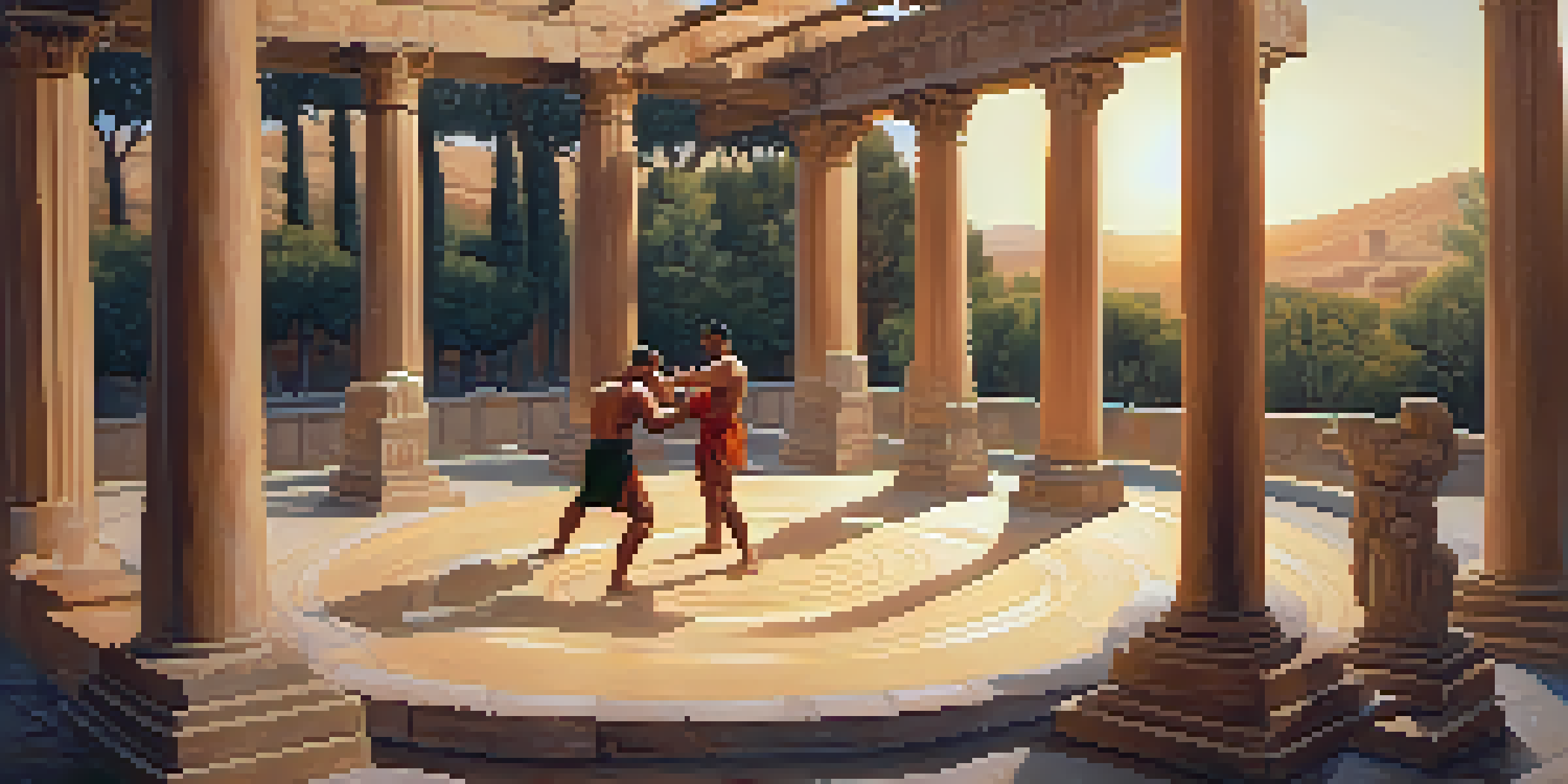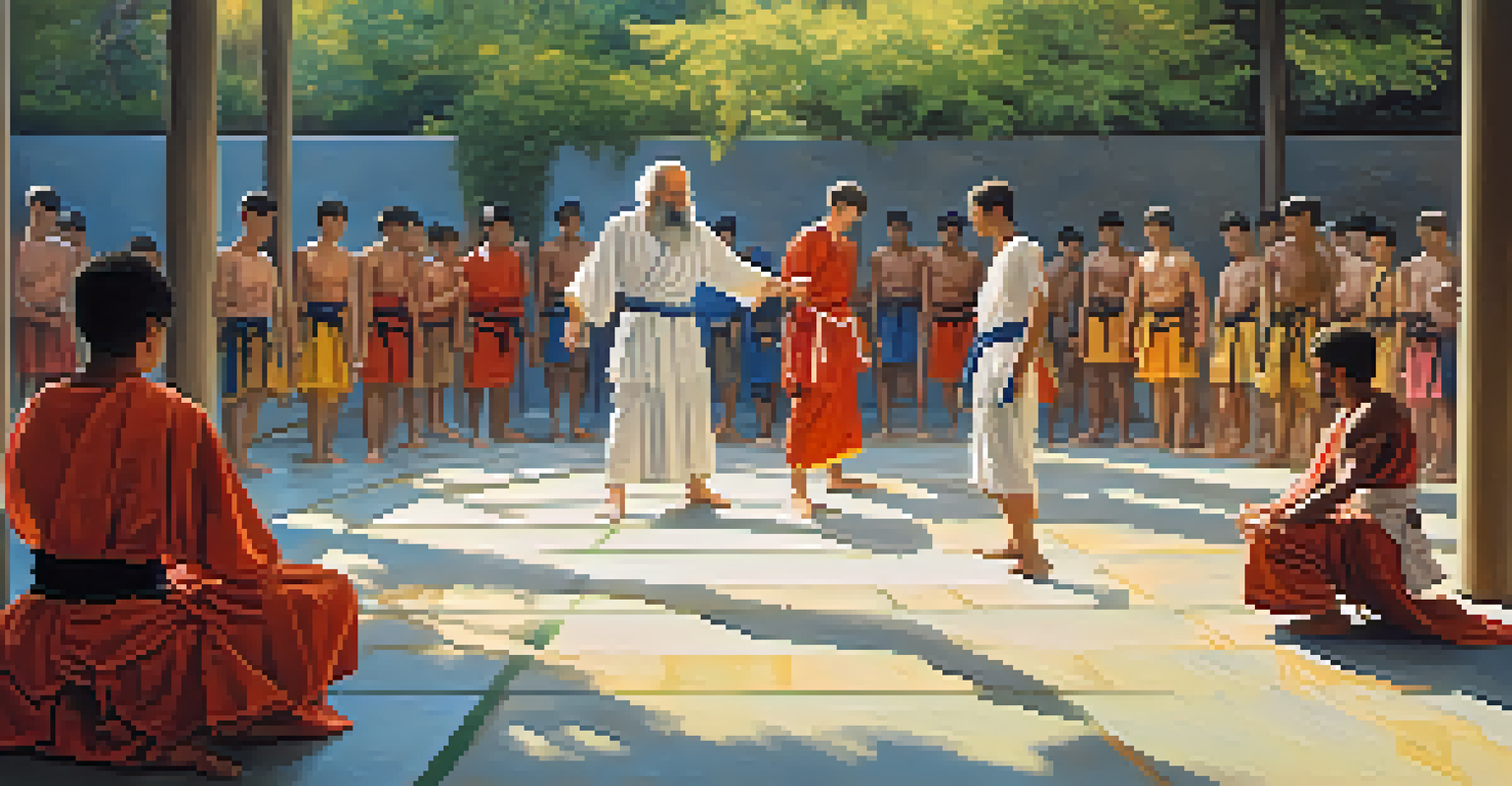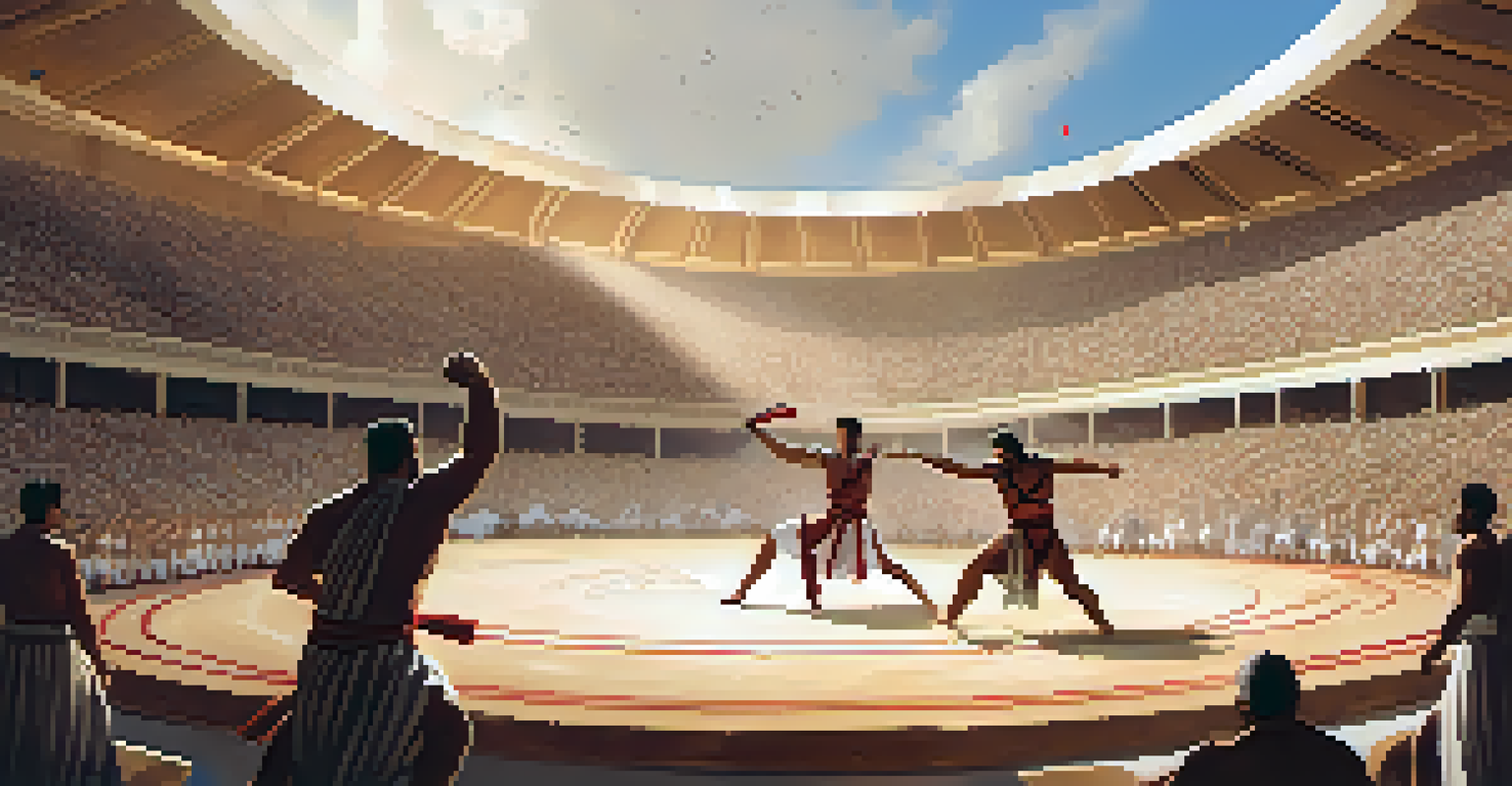The Influence of Ancient Greece on Modern Martial Arts

The Origins of Martial Arts in Ancient Greece
Martial arts have deep roots, and Ancient Greece is a significant source of inspiration. The Greeks practiced various combat sports, such as wrestling and pankration, which combined elements of boxing and wrestling. These sports were integral to their culture, celebrated during events like the Olympic Games, showcasing physical prowess and discipline.
The greatest victory is that which requires no battle.
The pankration was particularly noteworthy, as it allowed a wide range of techniques, reflecting a philosophy of adaptability in combat. This flexibility is echoed in many modern martial arts today, where practitioners blend styles to create comprehensive fighting systems. The competitive spirit of these ancient practices laid the groundwork for the structured training we see in martial arts schools now.
Moreover, the Greeks emphasized not only physical capability but also mental fortitude in their martial arts. This holistic approach resonates with contemporary martial artists who seek balance between body and mind, proving that the philosophies of ancient Greece still inspire modern practices.
Philosophical Underpinnings of Greek Martial Arts
Ancient Greek martial arts were deeply intertwined with philosophy, particularly the teachings of notable thinkers like Socrates and Plato. They believed that physical training was essential for developing virtues such as courage, discipline, and resilience. This idea is mirrored in many martial arts today, where practitioners often engage in self-reflection and personal growth alongside physical training.

The concept of 'arete', or excellence, was central to Greek philosophy and influenced how martial artists view their skills. This pursuit of excellence encourages modern martial artists to push their limits and strive for improvement, whether in technique or mental strength. Such values promote a culture of respect and dedication within the martial arts community.
Greek Roots of Martial Arts
Ancient Greece significantly influenced modern martial arts through combat sports like wrestling and pankration, emphasizing physical prowess and adaptability.
Furthermore, the Greeks understood the importance of ethics in combat, fostering a sense of honor among practitioners. This principle remains vital in modern martial arts, where respect for opponents and instructors is paramount, ensuring that the legacy of Greek philosophy continues to shape the moral landscape of martial arts.
Influence of Greek Combat Techniques on Modern Styles
The combat techniques developed by the ancient Greeks laid the foundation for various modern martial arts. For instance, the grappling techniques used in Greek wrestling can be seen in Brazilian Jiu-Jitsu and judo, where holds and throws are essential components. The effectiveness of these techniques has stood the test of time, proving their adaptability across different contexts.
Excellence is not a skill. It is an attitude.
Additionally, the striking methods from ancient Greek boxing have influenced disciplines like Muay Thai and kickboxing. By studying the footwork and striking angles of Greek boxing, modern practitioners can enhance their own skills and improve their performance in competition. This cross-pollination of techniques showcases the enduring legacy of Greek martial arts.
Moreover, the Greeks' emphasis on strategy and tactics in combat is something that modern martial artists constantly study. The ability to read opponents and adapt one’s techniques is crucial in today’s mixed martial arts (MMA), where fighters must be well-rounded. Thus, the tactical lessons from ancient Greece continue to enrich the training of contemporary martial artists.
The Role of Competition in Ancient Greek Martial Arts
Competition was a driving force in ancient Greek martial arts, particularly through events like the Olympic Games. These competitions not only showcased athletic skill but also fostered a sense of community and camaraderie among participants. This spirit of competition remains a hallmark of martial arts today, where tournaments and sparring sessions encourage growth and skill refinement.
The rigorous training and preparation for these competitions created a culture of excellence, similar to what we see in modern martial arts dojos and schools. Practitioners often engage in focused training to prepare for competitions, honing their skills and building resilience. This tradition of competition encourages martial artists to set goals and strive for personal bests.
Philosophy and Ethics in Combat
The teachings of Greek philosophers highlighted the importance of virtues such as courage and discipline, shaping the ethical standards in today's martial arts practice.
Furthermore, the Greek emphasis on fair play and respect for opponents has influenced the ethical standards of martial arts competitions today. These values promote a healthy competitive environment, ensuring that martial arts remain a positive force for personal development and community building.
Physical Conditioning and Training in Ancient Greece
Physical conditioning was paramount in ancient Greek martial arts, with rigorous training regimes designed to enhance strength, agility, and endurance. The Greeks recognized that a strong body was essential for success in combat, leading to a variety of exercises and training methods that are still relevant today. This understanding of physical fitness laid the groundwork for modern martial arts training programs.
Additionally, the Greeks incorporated a range of athletic activities, from running to weightlifting, into their training. This diverse approach to conditioning is mirrored in contemporary martial arts, where practitioners engage in cross-training to improve their overall performance. Such variety not only keeps training exciting but also helps develop well-rounded athletes.
Moreover, the emphasis on proper nutrition and recovery in ancient Greece is an important lesson for modern martial artists. Understanding how to fuel the body and allow for recovery is crucial in preventing injuries and ensuring long-term success in the martial arts journey.
The Cultural Exchange Between Greece and Other Martial Arts
The ancient Greeks were known for their openness to cultural exchange, which significantly influenced their martial practices. As they interacted with other civilizations, such as the Persians and Romans, they adopted and adapted various techniques and philosophies. This blending of ideas highlights the dynamic nature of martial arts and its ability to evolve over time.
Today, this spirit of cultural exchange continues in the martial arts community. Many practitioners explore different styles from around the world, incorporating elements from Asian, African, and other traditions into their training. This cross-cultural dialogue enriches the martial arts experience, allowing practitioners to learn from diverse perspectives.
Cultural Exchange and Evolution
The dynamic blending of techniques from various civilizations showcases the evolving nature of martial arts, fostering a rich, global community of practitioners.
Furthermore, the globalization of martial arts has made it easier for individuals to access various techniques and philosophies. This interconnectedness not only enhances personal growth but also fosters a greater appreciation for the historical roots of martial arts, including the significant contributions of ancient Greece.
Legacy of Ancient Greek Martial Arts in Modern Training
The legacy of ancient Greek martial arts is evident in the training methodologies employed by modern martial arts schools. The structured approach to learning techniques, combined with the importance of physical and mental conditioning, reflects the teachings of Greek combat sports. This blend ensures that practitioners develop both skill and character, echoing the values of ancient Greek athletes.
Moreover, the integration of competition, philosophy, and ethical training in modern martial arts can be traced back to the ideals established in ancient Greece. By embracing these principles, today's martial artists cultivate a sense of purpose and community, reinforcing the idea that martial arts is not just about fighting, but about personal development and mutual respect.

Ultimately, the influence of ancient Greece continues to resonate in modern martial arts, inspiring practitioners to honor their heritage while forging their unique paths. As martial arts evolve, the foundational lessons from ancient Greece remind us of the importance of balance, respect, and the pursuit of excellence in our training journeys.